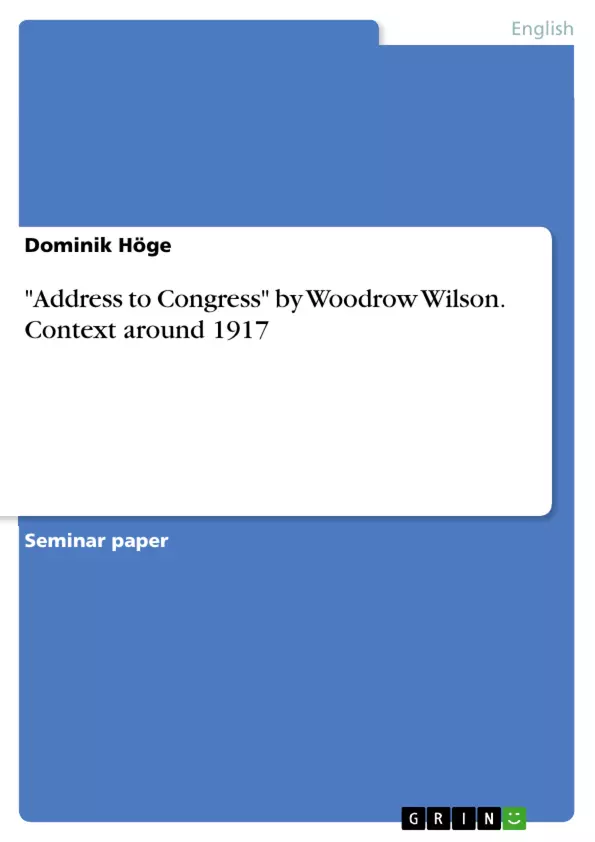When Wilson turned to the Congress on the second of April in 1917, he aimed to announce that political agreements and the relation to Germany were under dire threats. Only four days later, on the sixth of April 1917, the United States passed a war resolution that declared the entry into the Great War. The war had already been ongoing since 1914, when America eventually joined in 1917, however, there was no end in sight. The entry of America caused a massive change in the course of the war, but, apart from this, the participation in the war marked a significant step towards the pursuit of world power in American history.
Wilson requested a declaration of war against Germany in his speech Address to Congress because only the congress was granted to declare war as the constitution from 1789 had determined. He was aware of the fact that the Government, the Congress as well as the whole nation was not in favour of a war those days. Therefore, he used genius methods and technical brilliance to convince the Congress to engage in the war. On the basis of his persuasive speech he achieved to change America's attitude towards the war.
Aristotle once formed an outline on how to master persuasion that is called symboleutikon and aims to give speakers a sort of framework for their speeches on the one hand. On the other hand, it defines concrete principles of how persuasiveness can be attained through speech. It consists of three major persuasive appeals called ethos, pathos and logos whose deployment is inevitable in persuasive communication.
According to Aristotle's outline, ethos is used to give insight in the speaker's credibility and reliability. Pathos refers to an appeal to emotion, to evoke emotion and to move the audience. His last term logos describes the use of reason, logic and the use of evidence.
Inhaltsverzeichnis (Table of Contents)
- Close Reading - Address to Congress
- Context around 1917
- Woodrow Wilson
- Zimmermann telegram
- Anti-German sentiment
- Great War
- Term Imperialism
- Additional Source Material
- "Destroy this mad brute - Enlist"
- "School begins"
- Discussion Questions
- Bibliography
- Appendix
Zielsetzung und Themenschwerpunkte (Objectives and Key Themes)
This text examines Woodrow Wilson's "Address to Congress" from 1917, focusing on its rhetoric and its role in persuading the United States to enter World War I. The text analyzes the speech's rhetorical strategies, specifically those inspired by Aristotle's "symboleutikon," which emphasizes ethos, pathos, and logos.
- The rhetorical techniques employed in Wilson's "Address to Congress."
- The historical context surrounding America's decision to enter World War I.
- The impact of Wilson's speech on public opinion and the American government's decision to go to war.
- The role of rhetoric in shaping public policy and international relations.
- The relationship between rhetoric, power, and persuasion in a historical context.
Zusammenfassung der Kapitel (Chapter Summaries)
- Close Reading - Address to Congress: This chapter examines the historical context surrounding Wilson's speech, noting the ongoing war in Europe and the United States' eventual decision to join in 1917. It highlights Wilson's intent to persuade Congress to declare war against Germany, emphasizing the speech's strategic use of rhetoric.
- Context around 1917: This chapter provides a deeper exploration of the historical context surrounding the speech, focusing on events such as the Zimmerman telegram and the growing anti-German sentiment within the United States.
- Additional Source Material: This chapter examines additional source material related to the context of Wilson's speech, such as posters and slogans urging enlistment.
Schlüsselwörter (Keywords)
The primary focus of this text is on the rhetoric and historical context of Woodrow Wilson's "Address to Congress" in 1917. Key terms include: rhetoric, persuasion, ethos, pathos, logos, World War I, American history, political discourse, public opinion, and international relations.
- Arbeit zitieren
- Dominik Höge (Autor:in), 2020, "Address to Congress" by Woodrow Wilson. Context around 1917, München, GRIN Verlag, https://www.grin.com/document/1481908



